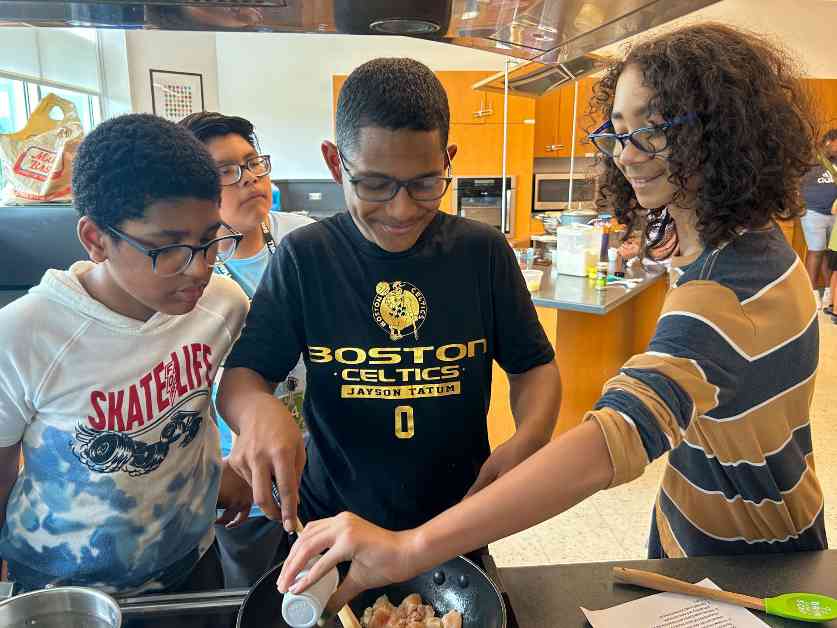Summer Learning Programs: Closing the Education Gap for Students Before Federal Funding Expires
In a middle school classroom in Lynn, Massachusetts, four teenage boys reluctantly spent their summer days creating a poster featuring icons of their favorite apps. Despite their initial resistance to attending school in the middle of July, the boys admitted that the program, which combines project-based learning with enrichment activities in arts and sports, turned out to be more enjoyable than they expected.
Summer learning programs like the one in Lynn have become increasingly popular, especially among low-income students who often lag behind their peers in reading proficiency. These programs have seen a surge in funding over the past few years, thanks to billions of dollars in federal recovery aid distributed by states in response to the pandemic. However, as the federal funding begins to dwindle, many programs are facing the challenge of sustaining their operations and serving a sufficient number of students in the coming years.
Despite the widespread availability of summer programs in 2023, experts warn that these initiatives are not yet operating at a scale that can effectively address the learning loss caused by the Covid-19 pandemic. With the looming expiration of federal funds, many programs are bracing for budget cuts and reduced services, which could result in fewer students being served next summer. Organizations like the Dream MORE program in Lynn are already seeking alternative sources of funding, such as grants and donations, to fill the gap left by the diminishing federal support.
Patrick Stanton, the executive director of the Massachusetts Afterschool Partnership, expressed concern about the potential impact of funding cuts on families who rely on summer programs for academic support and enrichment. He cautioned that without adequate financial resources, many programs may be forced to shut down, leading to longer waitlists and limited access to educational opportunities for students in need.
Challenges and Opportunities in Summer Learning
The Covid-19 pandemic has exacerbated educational disparities among students of different socioeconomic backgrounds, with low-income students experiencing more significant learning setbacks compared to their wealthier counterparts. In Massachusetts, where schools are known for their academic excellence, the widening achievement gap between low-income and affluent districts has raised concerns about the long-term impact of the pandemic on student outcomes.
In Lynn, a city with a high poverty rate and a growing population of English language learners, the educational challenges have been particularly pronounced. An analysis by The Harvard Center for Education Policy Research and Stanford’s Educational Opportunity Project revealed that students in Lynn suffered substantial learning losses during the pandemic, with some falling behind by two years in math and reading proficiency.
The influx of federal aid through the American Rescue Plan Act was intended to help districts like Lynn address the learning loss and support students’ academic recovery. However, despite the significant financial resources allocated to summer learning programs, many low-income districts continue to struggle to close the achievement gap and meet the academic needs of their students.
The Impact of Summer Learning Programs
While the effectiveness of summer learning programs in addressing learning loss remains a topic of debate, there is evidence to suggest that these initiatives can have a positive impact on student outcomes. A study conducted by Bloomberg Philanthropies found that students enrolled in a program at public charter schools in eight cities were able to recover a substantial portion of their Covid-related learning loss in math and reading.
However, another study examining the academic progress of students who participated in summer school across eight districts revealed only modest gains in math and no improvement in reading proficiency. The study highlighted the challenge of engaging students in summer learning, with a low enrollment rate reported across the districts surveyed.
Experts believe that one of the reasons for the limited success of summer programs is the lack of awareness among families about the extent of their children’s academic challenges. Many students view traditional summer school programs negatively, associating them with remedial education and academic struggles. In contrast, modern summer learning initiatives offer a blend of hands-on projects and engaging activities to attract students and keep them motivated to learn.
By providing opportunities for students to explore their interests, develop new skills, and build social connections, summer learning programs like the Dream MORE initiative in Lynn aim to not only address academic gaps but also foster student engagement and well-being. The program offers a range of project-based learning experiences, from robotics and cyberbullying to dance and environmental studies, catering to diverse interests and learning styles.
Challenges and Opportunities Ahead
As federal funding for summer learning programs approaches its expiration date, schools and districts must navigate the challenge of sustaining these initiatives without compromising the quality of education and support offered to students. While the extension granted by the Education Department provides a temporary reprieve, long-term solutions are needed to ensure that students, particularly those in high-poverty districts, can continue to access educational resources and opportunities beyond the pandemic.
By investing in comprehensive strategies to address learning loss, schools can mitigate the impact of the pandemic on student achievement and well-being. Summer learning programs play a crucial role in this effort, providing students with the academic support, enrichment activities, and social connections they need to thrive in school and beyond.
As the education landscape continues to evolve in response to the challenges posed by the pandemic, it is essential for policymakers, educators, and community stakeholders to collaborate on innovative solutions that prioritize equity, access, and excellence in education. By leveraging the lessons learned from the pandemic and building on the successes of summer learning programs, schools can create a more resilient and inclusive education system that meets the needs of all students.

